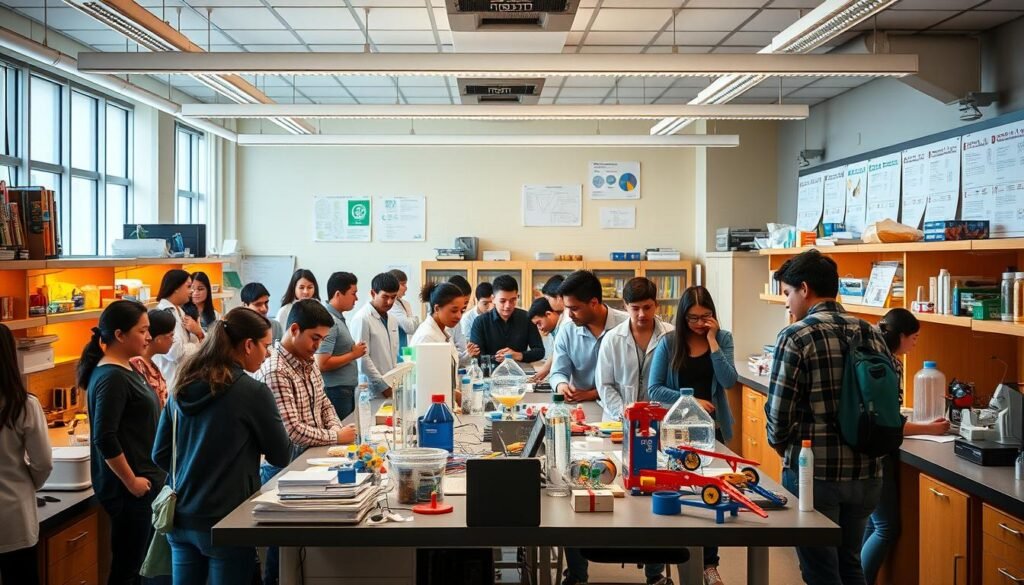University research opportunities give undergraduate students a chance to boost their career chances. They can work in labs or do field studies. This lets them explore questions and add new insights to their fields.
Employers see the value in this hands-on learning. It teaches students many skills that employers want. These skills include problem-solving, creativity, teamwork, and communication.
Studies show that 41% of U.S. employers prefer candidates with research experience. This shows how valuable these opportunities are.
Key Takeaways
- University research opportunities provide hands-on experience that develops in-demand skills for the job market.
- Employers view undergraduate research experience as a significant advantage when hiring, with 41% more likely to hire these candidates.
- Research projects cultivate critical thinking, problem-solving, teamwork, and communication abilities that are highly valued by employers.
- Engaging in research can broaden and deepen students’ classroom learning, enhancing their overall academic and professional development.
- Undergraduate research experience can positively influence students’ career paths and graduate school decisions.
Understanding University Research Opportunities
University research opportunities give students valuable experiences that boost their career chances. They offer more than just classroom learning. Students get to work on real research projects or explore new areas of study.
By diving into this world, students learn about the research process. They also understand their field of study better.
Defining Undergraduate Research Projects
Undergraduate research projects let students work with professors on various research tasks. These tasks can be in many fields, like physics or environmental studies. Students can join ongoing projects or suggest their own ideas.
This approach encourages innovation and critical thinking.
Types of Research Programs Available
- Paid summer research programs sponsored by organizations like the National Science Foundation
- Opportunities to earn academic credit for research-based coursework
- Interdisciplinary research centers and institutes that welcome undergraduate participation
Role of Faculty Mentorship
Faculty mentors are key in guiding undergraduate researchers. They share their knowledge and help students understand the research process. They also encourage students to think differently.
Through working with faculty, students learn important skills. These include data analysis, problem-solving, and communication. These skills are highly valued in the job market.
“Research experiences can be transformative, allowing students to apply their classroom knowledge to real-world problems and develop a deeper understanding of their field of study.”
By taking part in university research, undergraduates open doors to personal and professional growth. This sets them up for a successful career.
The Impact of Research Experience on Employability

Getting involved in university research can really boost your job chances. The American Association of Colleges and Universities found that 41% of US employers want to hire someone with research experience. Younger employers especially value these experiences more than older ones.
Employers look for graduates with key skills. These include critical thinking, teamwork, and applying knowledge in real-world situations. They also want digital literacy, problem-solving, ethical judgment, and good communication. Luckily, all these skills are developed through research projects.
“Undergraduate research initiatives can benefit academic institutions, faculty mentors, and students, leading to the development, maintenance, and sustainability of such programs.”
In today’s knowledge-driven economy, getting students involved in research is key. Universities can give students the skills and mindset needed to succeed. Research experience not only boosts employability but also shapes long-term career trajectories, opening doors to diverse professional paths.
Undergraduate research can change a student’s academic and professional life. It improves critical thinking and ethical reasoning, preparing students for many careers. By linking theory to practice, research opportunities enhance employability and open up a world of career prospects.
Essential Skills Developed Through Research

Being part of university research is a game-changer. It teaches students valuable skills that employers love. You learn to think critically, solve problems, and analyze data. These skills are key to success in your career.
Critical Thinking and Problem-Solving
Research projects push students to think deeply and find new solutions. They learn to break down big problems and choose the best options. These skills are highly sought after in many industries.
Data Analysis and Technical Proficiency
Research lets students get hands-on with tools and methods. They learn to work with data and use special software. These technical skills are a big plus in the job world.
Project Management Capabilities
Research teaches students to plan, do, and report on projects. They learn to manage time, pay attention to details, and communicate well. These skills are essential for the modern workplace.
By doing research, students get ahead in the job market. They become adaptable, critical thinkers with strong technical skills. These abilities are the base for a rewarding career.
“Research is the foundation for developing the essential skills that employers seek in today’s rapidly evolving job market.” – Dr. Emma Atkins, Director of Undergraduate Research Programs
Professional Network Development

Getting involved in university research is a great way for students to make important professional networking connections. These experiences introduce students to new people in academia and industry. This can greatly affect their career connections and future job prospects.
Research projects give students a chance to meet with faculty mentors. These mentors offer advice, support, and recommendations. They have deep knowledge and connections that can help students find their way in their careers.
- Building an online presence is key for scientific researchers. They should have profiles on LinkedIn, Twitter, and ResearchGate.
- Networking events like conferences and seminars are great for researchers. They can show off their work and meet others in their field.
- Researchers should publish their work in journals or blogs. This helps them get noticed and attract interest.
Students also form strong bonds with their peers in research. This creates a community of people with similar interests and goals. These professional networking connections can lead to future collaborations and job opportunities.
By joining university research, students meet many different people in their field. This opens up new paths for personal and professional growth. It can also shape their academic relationships and career paths for the long term.
University Research Opportunities and Career Advancement

Getting involved in university research can give students a big edge in the job market. It offers benefits that last long after school. These chances help students grow in their careers in many fields.
Long-term Career Benefits
Research projects in college teach students valuable skills. They learn to think critically, solve problems, and work with technology. These skills are key for success in today’s jobs.
Students also learn to manage big projects. This skill is important for their professional growth.
Industry-Specific Advantages
Research in specific areas can give students a big advantage in their future careers. For example, studying renewable energy or medical treatments. This knowledge makes them stand out for jobs in those fields.
Professional Growth Trajectories
Being part of research programs can really help students grow in their careers. They learn to lead, think strategically, and handle complex projects. These skills are highly valued by employers.
They also get to know important people in their field. This can lead to great opportunities and collaborations in the future.
| Research Program | Stipend | Duration |
|---|---|---|
| Biomedical & Bioinformatics Research Internship and Training Experience (B-BRITE) | $4,500 | 8 weeks |
| BRUSH Summer Research Program | $9,600 (includes stipend and room/board) | 10 weeks |
| Plant Genomics @ MSU REU Program | $6,500 (plus travel support) | 10 weeks |
| Reproductive and Developmental Sciences Summer Undergraduate Research Experience | Stipend, travel, and lodging | Not specified |
| Summer Cardiovascular Research Experience at MCW AHA SURE Program | $6,000 (plus free lodging and travel) | Not specified |
| Summer Cardiovascular Research Experience at MCW NIH ASPIRE Program | $6,000 (plus $1,400 stipend for meetings) | Not specified |
Many universities and groups offer research chances. These opportunities help students gain experience, learn industry-specific skills, and move forward in their careers.
Bridging Academic Knowledge and Practical Experience

University research opportunities are key in linking academic knowledge with practical experience. Students in research apply theoretical ideas to real-world problems. This makes their understanding of course materials better and gets them ready for their future careers.
Research lets students dive into meaningful changes in their fields. They learn to see the practical application of what they study. This turns their learning from just theory to something that matters in the real-world.
This link between classwork and real-world use makes studies more relevant. It gets students ready to handle the complex issues of their future jobs. By closing the gap between theory and practice, research helps students grasp their fields fully. This sets them up for success in their future careers.
| Benefit | Description |
|---|---|
| Enhanced Understanding | Research experiences help students apply theoretical concepts to real-world problems, deepening their comprehension of course materials. |
| Practical Preparation | Engaging in research projects prepares students for the challenges they will face in their future careers, bridging the gap between academic knowledge and practical experience. |
| Meaningful Contribution | Research opportunities allow students to become actively involved in driving meaningful change within their fields of study. |
By mixing academic knowledge and practical experience, university research programs help students understand their fields deeply. This prepares them for success in their future careers.
Research Impact on Graduate School Applications

Doing research as an undergraduate can really help you get into graduate school. It shows you understand what graduate school is like. This makes you a stronger candidate.
Research shows you can work on your own, think deeply, and add to your field. It lets you explore what you might study further. Plus, it gets you good recommendations from professors.
Being part of research projects shows off your skills and passion. It makes your application stand out. A good project can show real value and impact. Starting early means you can build a strong research portfolio.
| Metric | Percentage |
|---|---|
| URGs represent earned baccalaureate degrees in science | 14% |
| URGs represent earned BSE/BHS doctorates | 6% |
| Non-URG peers earned baccalaureate degrees in science | 81% |
| Non-URG peers earned BSE/BHS doctorates | 74% |
In short, research as an undergraduate can really boost your graduate school chances. It shows your skills, dedication, and knowledge in your field.
Also Read: Financial Aid For University Students Guide
Conclusion
University research opportunities boost students’ career chances by giving them key skills and networks. They learn to think critically and solve problems. This makes them stand out in the job market.
Being part of research projects also helps students get ready for graduate school. It teaches them to tackle real-world issues. This way, they’re set for success in their future careers.
In today’s tough job market, research at university is a big plus. It helps students grow professionally and prepares them for long-term success. By taking part in research, students can really make their mark in their chosen fields.
FAQs
Q: What are undergraduate research opportunities and how can they benefit students?
A: Undergraduate research opportunities allow students to participate in hands-on research projects under the guidance of faculty members. These experiences can enhance research skills, provide valuable insights into their field of study, and strengthen their resumes, making them more competitive in the job market.
Q: How can I get involved in student research as a sophomore?
A: Sophomores can explore opportunities by reaching out to their professors or academic advisors, attending information sessions, and looking for undergraduate research programs available in their department or college. Many programs provide resources and support to help students engage in cutting-edge research.
Q: What types of research activities are available for juniors and seniors?
A: Juniors and seniors often have access to more advanced research activities, including research fellowships, summer research experiences, and specialized projects within their field. These opportunities may also include working on research grants or participating in a scholars program.
Q: Are there specific research fellowships available for students in the social sciences and humanities?
A: Yes, there are numerous research fellowships specifically targeted at students in the social sciences and humanities. These fellowships often focus on topics relevant to these fields and may offer funding and support for research projects.
Q: What is a summer research experience and how can it enhance my career prospects?
A: A summer research experience involves dedicating part of the summer to work on research projects, often funded through research grants. This experience not only helps students develop their research skills but also allows them to network with faculty and other scholars, which can lead to future career opportunities.
Q: How do university-sponsored symposiums contribute to student research initiatives?
A: University-sponsored symposiums provide a platform for students to present their research findings to peers and faculty. This experience enhances public speaking skills and allows students to receive feedback, fostering further development of their research initiatives.
Q: What support systems are in place for students who want to engage in cutting-edge research?
A: Many universities offer support through dedicated research offices, mentorship programs, and funding for research projects. Additionally, faculty members are often willing to guide and support students interested in participating in research activities.
Q: Can participating in research lead to more opportunities for students after graduation?
A: Absolutely. Engaging in research not only builds essential skills but also enhances a student’s resume and academic profile. This can lead to more opportunities for graduate school, internships, and jobs in competitive fields.
Q: What are the benefits of collaborating with faculty members in research?
A: Collaborating with faculty members allows students to gain insights from experienced scholars, receive mentorship, and develop professional relationships. This collaboration can also provide students with access to exclusive research opportunities and resources unavailable to those not involved in research.
Source Links
- https://pmc.ncbi.nlm.nih.gov/articles/PMC4739295/
- https://ugradresearch.uconn.edu/why-undergraduate-research/
- https://our.unc.edu/find/
- https://www.umt.edu/undergraduate-research/research/why-research.php
- https://las.illinois.edu/research/students
- https://www.berry.edu/articles/blog/2024/undergraduate-research
- https://pmc.ncbi.nlm.nih.gov/articles/PMC9420469/
- https://www.eneuro.org/content/11/7/ENEURO.0217-24.2024
- https://www.cur.org/wp-content/uploads/2023/09/333Spring13Showman16-20.pdf
- https://www.immerse.education/study-tips/research-skills-a-guide/
- https://in-part.com/blog/build-and-extend-your-network-as-a-scientific-researcher/
- https://vbrn.org/professional-development-education/
- https://www.cur.org/resources-publications/student-resources/internship-and-research-opportunities/
- https://drexel.edu/research-innovation
- https://extramural-diversity.nih.gov/career-pathways/success-strategies
- https://www.kent.edu/esdri/news/student-researcher-bridging-knowledge-two-eyed-seeing-method
- https://pmc.ncbi.nlm.nih.gov/articles/PMC11092060/
- https://mab-online.nl/article_preview.php?id=30360&skip_redirect=1
- https://pmc.ncbi.nlm.nih.gov/articles/PMC10002406/
- https://www.heri.ucla.edu/nih/downloads/AERA-2014-Undergraduate-Research-And-STEM-Grad-Enrollment.pdf
- https://www.varsitytutors.com/blog/post/why-research-experience-is-important-for-grad-school-apps
- https://libguides.usc.edu/writingguide/conclusion
- https://writingcenter.fas.harvard.edu/conclusions
- https://writingcenter.unc.edu/tips-and-tools/conclusions/





